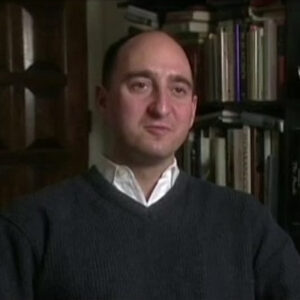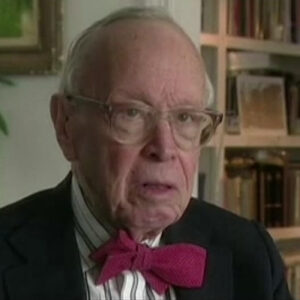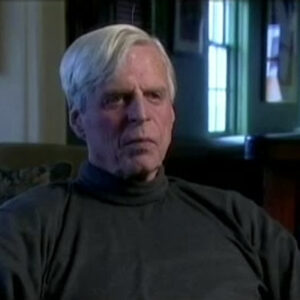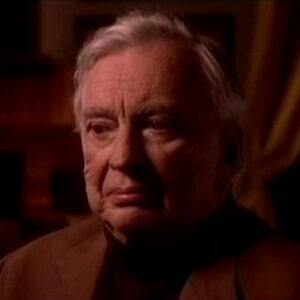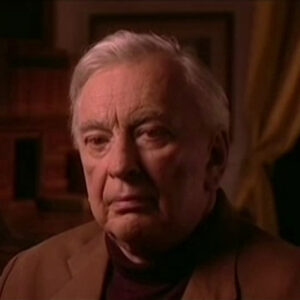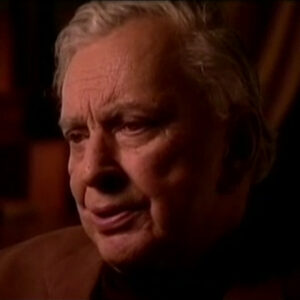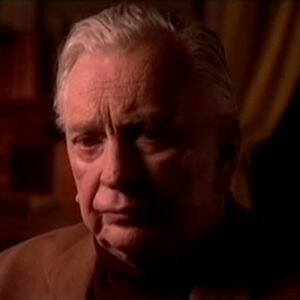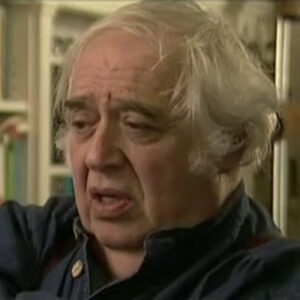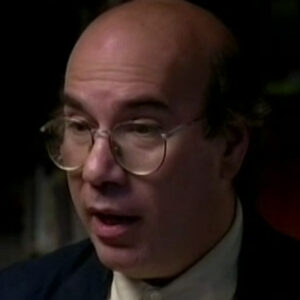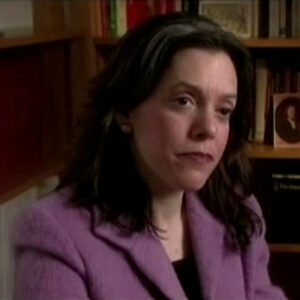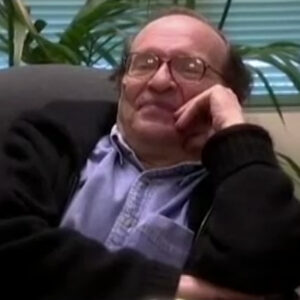Speaker You met Gore, I think it was something as long ago as, say, about forty two years ago. Forty one years ago. It’s over 40 years ago anyway.
Speaker And Jason and I were were friends of Fred Duppy, who was a critic of F.W. de PE, who had a house up there with his wife and children. We go up to visit them on weekends sometimes, and that’s when Fred and and and it took us over, including a two year old son to visit Gore and this absolutely wonderful house and Berrytown. And it was amazing, the house was extraordinarily beautiful, it was right on the water, which also was interrupted by rail tracks. So every so often you would get the Hudson Express going forward. But nevertheless, it was absolutely beautiful because, as usual, marvelous host. And he was just incredibly attractive person. And Howard was there and he was charming. And that’s when the friendship started. You know, I was going to ask if you would tell me what it was like there, where he was then really great looking, beautiful, very graceful and just unbelievably charming as he still is, as you’ve met him.
Speaker And you can see that and. Extremely funny, and you could tell how smart he was in the beginning, so of course, I got a huge crush on him. So that was the first meeting I gave. You weren’t alone?
Speaker Oh, no, alas.
Speaker And and.
Speaker Tell me what the intellectual and artistic climate in New York was at that time, Gorbals of the Golden Age?
Speaker Well, this is in the 50s and everything seemed possible. It was enough time after the war. Jason and I had just had been within the past, you know. When for the past five, six years had come to New York, which was very new. We both came from New England and everything seemed possible. I mean, there were there was a tremendous amount of talent and us particularly in it in fiction writing. And Gore was, you know, just as sort of an amazing person. He also I think this was after a visit to a small planet when he made a little bit of money. And but he had already published several several novels and and, of course, made another reputation, television. And it just seemed a time when, whatever one might say about the 50s, New York was very, very lively. I mean, for example, I was struck that when I myself first came to New York that you could go to some school public high school in New York and hear the Budapest Quartet for nothing. I mean, it seemed also a little bit socialist. You know, it was a kind of amazing, sort of idyllic place in many ways. And also it was not overcrowded, it was not noisy, and apartments were still very difficult to get. I mean, I was always moving from one place to another, but at the same time, it was full of possibility.
Speaker Partly it is, is that all of us were really a lot younger than we are now. So it know we have a lot ahead of us. So let’s jump a little bit forward in time and tell me how and when the New York Review of Books began at The New York began in sixty three, was actually late 62 when The Times went on strike. And I don’t know whether you remember this at all, but it went. The Times was out and the other newspapers were out and the Times book review at that time was the only was the only reviewing medium that really made any difference to, say, writers, and that Jason had the idea. This is Jason Epstein, my former husband, who to that this was the time when Advertized publishing publishers didn’t have had nowhere to go with their advertisements of these books. Meantime, writers who had just spent 10, 14 years in a book saw the book come out and nobody knew about it because the time was a monolithic force, so to speak. So he he had the idea now is the time, because previously a lot of there was a tremendous amount of of disaffection about the Times book review, which was very perfunctory. And Elizabeth Hardwick, for example, had written a piece in Harper’s magazine about the decline of book reviewing in America. And it was very widespread feeling among many of us in New York and among writers. And I don’t know what publishers. But in any case, at that point, we just on our own, we had absolutely no money at all. We Robert Lowell, the poet, had a little trust fund and they borrowed ten thousand dollars of it to pay the printer. We asked a lot of people we knew and rather shamelessly, a lot of people we didn’t know to contribute to that first issue. And Gore was one of them and eagerly contributed. And also for publishers were very supportive. And I think without the publishers, we probably couldn’t have survived because they they immediately. I bought ads and that’s what supported us. I mean, we didn’t take any money that writers didn’t take any money, and then after that first issue, we raised money at a very minimal amount and then were able to pay writers. So it was just it was a fluke. And it really was the kind of thing that you could never do today. I don’t think because it was the Times strike and that there was really very little else. You know, there was Time, Newsweek than they had back of the book book. But there was no real reviewing. There was, in fact, book reviewing was not taken terribly seriously at the time. So that gave us a tremendous opportunity. And of course, it was the 60s and that was also a golden age where people thought they could do things like that, you know?
Speaker So do you want the water in between? Yes, desperately.
Speaker The action is off the record, right, OK.
Speaker Uh.
Speaker Tell me about Gore’s essay style or what makes him such a great asset, right?
Speaker That’s so hard to answer because he is, I think, perhaps the best living today or certainly one of the three or four best I can’t think of.
Speaker I don’t want to say this, but it’s the clarity, the wit, tremendous authority. I mean, he really when he’s writing particularly about American literature, he really loves this stuff. You know, when something like our American history, he’s absolutely amazing because he has tremendous authority and tremendous passion about this. There’s a piece that he did once for us on Ulysses S. Grant. And I think it was a review. It was either a review of a biography, but of the memoirs which you brought in. And it was just an astonishing sort of it made you really want to run out and read Grant. And that’s true of, you know, all these all these essays that he’s done.
Speaker And Richard.
Speaker He also, for example, he also gets enthusiasm’s for writers who are less well known. He’s written about he was one of the he was perhaps since Edmund Wilson wrote an article of her while she was still alive. He was the first one to notice Don Powell, whom he had known slightly but based on her revived, totally changed the whole view of her and made a really quite important she’s you know, she’s in print now, as she had not been for like 40 years or 30 years. And so, I mean, he’s done great services in that way. He’s incredibly fluid. He’s a marvelous writer, too. And of course, there’s that amazing wit that comes through all the time and a kind of personal charm that comes through the kind of personal in a way that he’s not he’s not I don’t mean he’s talking about himself, but there’s a kind of closeness to another writer that he he feels that makes his criticism so alive.
Speaker So thank you. You’re you want more water in between?
Speaker OK. Was is there just so many that he’s done for you? But is there a particular you mention the Don Powell I know he introduced Covino as well.
Speaker That’s right. That’s right. Do you have a favorite essay or.
Speaker Oh, gosh, that’s so hard to tell because I really, really love so many of them.
Speaker I really have a great, great feeling for them. And I’ve learned a lot, too.
Speaker And it’s hard to say, you know, to pick any of them out that which, of course, my mind goes blank when everything interview and so on. Tim’s thinking, well, we can come back to that, OK, we can throw in if I can think of anybody, you know. I mean this the right time to ask you to do something.
Speaker And even if we do, you want me to read it?
Speaker Well, I’m just now just that you might pick up a paragraph or something.
Speaker That’s good. Where we’re my course. OK, I have something. OK, but just so anything is in fact.
Speaker Tell me about your relationship with Gore as as an editor.
Speaker Well, he’s wonderful to work with and it’s amazing that you spot sometimes not very often you spot something that just Jarrah’s is not true or else that it’s not quite clear what he means or something like that.
Speaker And I’ve never known anyone who could think on his feet so quickly. And in one second, the whole little little passage is fixed.
Speaker And the only one looking at these pictures, manuscripts, and it was they were almost always absolutely fascinating to me because there would be just a draft or which could have been second or third draft.
Speaker I don’t know. It could be first and then. Over it would be this blue ink in his handwriting in which, you know, the sort of suddenly the whole page would begin to shine, you know, but somehow just a word or a phrase would just bring everything to life and goes the same way that he’ll tie up that. It’s a tremendous well, it’s a great talent, enormous talent of adjectives, for example. That’s a force for good at that.
Speaker So what, in your opinion, is Gore’s greatest strength as a writer?
Speaker Not just as an essay writer, perhaps, although it could be that.
Speaker Well, it’s hard to single out what makes, you know, what what goes into a style or what goes into, first of all, the tremendously independent mind that and vast intelligence, of course, I mean, is just and is so quick.
Speaker But it’s the independence, the courage to say what he thinks. And, of course, the tremendous ear he has for language. And, you know, there’s not a I’ve never spotted any I don’t think I’ve spotted a bit of jargon or cliche, but I mean, he’s a really master of language is extraordinary that way.
Speaker For what do you think he will be remembered as a writer?
Speaker Well, maybe those qualities of, you know, independence, courage, a beautiful writer.
Speaker You know, a number of other things, I’m sure I’ve forgotten that.
Speaker Can you tell me about the article you wrote, Pink Triangle and Yellow Star and why you folks turned it down?
Speaker Actually, now wait a minute. Is that the one? I’m not sure we did turn it down.
Speaker Now, which one was that? Is that the one that was in the nation?
Speaker Yeah, it ended up in the nation. It was the one about saying that this is news.
Speaker And you’re right, we actually he was doing that for the nation. I mean, you could check with Gore, but I’m certain that it was really not commissioned by us. It was it was for the nation in the first place.
Speaker Well, I think, you know, sometimes I think.
Speaker I know what he said, and I swear his clarity and so on, I think tripped him up slightly.
Speaker Not that I don’t think the essay is very admirable in many, many ways, but I think it triggered off a lot of very sensitive spots, which are actually a bit of rewording or a bit of more balance would have done that. I mean, Gore is no more anti-Semitic than any of us, and I mean, far from it. But the thing is that he was very angry at these people who have been attacking him continually. And when Gore is attacked, he attacks back. I wouldn’t want to get into a frazzle with Gore on paper particularly.
Speaker But but I think what he had to say has a lot of truth in it, too, without but, you know, unfortunately, it was put in such a way and so succinctly the he should have been longer and more analytical and so on. But it was like a little it sounded a bit more like a polemic than I think he intended. And it was taken as a polemic. I don’t think it’s one of his his great pieces, quite honestly, but I think it was written in great heat.
Speaker And so in any case, I just assumed that part of it was, man, you know, I hate to get into the polemical side, if you don’t mind. Right.
Speaker Well, then I’m going to ask you this question if you think anyway, well, maybe I’ll cover my tracks.
Speaker But no, I was going to say it from time to time when we turned down by folks, Gore swore he was calling it quits, but you managed to coax him back.
Speaker I think he gets mad because we all do that.
Speaker We’re very, very old friends and very, you know, and have had a working relationship that I think is wonderful. And and with the New Yorkers, we don’t have to agree. And it’s not that I don’t even want to get into that agreement or not because we stand by everything we said. But please, you’re actually.
Speaker From what I understand, one of the closest people to Gore, I mean, well, I feel he’s one of my closest friends, too, and it’s a very, very long friendship and.
Speaker There you are. So I think underneath that, there’s a kind of we have this sort of not so much a double life because I think we do understand each other. And so I think that works. At least I hope it does.
Speaker How much water? Yeah, a few more questions. Alaska.
Speaker Or you can have more. I don’t want to rush you. We have plenty of time. OK.
Speaker So I was going to say, and you probably answered this, but maybe I was going to ask you what you love about Gore.
Speaker Oh, that’s always so hard to to talk about when there’s somebody that you’re very close to and very enormously fond of admire.
Speaker It’s always hard to single out that quality. I like Gore for being Gore, you know, and there’s nobody like him, really not.
Speaker Do you have. Can you think of an anecdote that you could share with us that would.
Speaker That’s always good. We think. Oh.
Speaker There are I think you should use pretty well is just to get the funniness and the, you know, the.
Speaker I mean, I’m not saying that he’s not, you know, extremely sensitive, which is another thing that would go into that. This is just that would go into the pink trial or whatever it is that he was. He’s extremely sensitive to attack. And he has at the same time, this a paradox because, of course, by being so outspoken, he sort of asks for it. And it’s going to be an awful lot. I mean, most people don’t read much of anything. They just hear it or they read a sentence or they take innocence. So so I think a lot has been misunderstood or perhaps understood also, but it gets him into terrible trouble.
Speaker People are not terrible trouble. I mean, trouble or that is people attack him and so on. And he’s sensitive about it, as you know, who is not. But he’s never tried to avoid it, you know, saying what he thinks. And he sort of takes it on the. Wherever you take it.
Speaker Things I like about him or if you have an anecdote or if you think, you know God, it’s so hard to a picture of him. Oh.
Speaker I want one that’s very adorable right now. Well, that’s the what’s my initial?
Speaker OK, I’ve got so many, but I just, you know, it’s just so hard for me to it’s, you know, to to single out, some of them are really we were worth.
Speaker He arrived late from from Italy and got into his hotel and I wasn’t doing anything and he said, I’m starving, I’ve just got off the city’s plane and it was quite late. Nine thirty or ten. And I said I hadn’t seen him in about a year or something like that. So and so I did rush over because I loved, you know, I love this company. And so we went somewhere. I think it was a restaurant no longer in existence. And we started having dinner around 10:00 and we had a few drinks.
Speaker And at about eleven thirty, the captain came over and said senior legal or whatever the waiter would like to get to Cook would like to go home. And he said, oh that’s fine, do let him get home, go home, just send another waiter. I mean, I don’t know quite what it says, you know, but it’s just it’s just tremendously it’s not only fasters feet, but it just has this very direct reaction to everything and.
Speaker But it usually has some message of thought behind it, so.
Speaker Uh.
Speaker You can keep thinking you might find something.
Speaker I’ll try something funny after.
Speaker What do you love about four hours to say what drives you crazy about Gore?
Speaker It doesn’t take my advice all the time. That’s OK, that’s the first thing I think.
Speaker I’m trying to go back to something, you know, that I love that he’s written and there’s so much of it in my head and I can’t bring any of them up to my mouth.
Speaker Hmm. I want to see the book. Let me see. Let me just take a look while we’re here.
Speaker What have you got? United States.
Speaker One thing I would say is that I remember looking at some of Gore’s earlier collections and even some of them that he had written before, I know him. And for example, he has his first piece on Norman Mailer, which was so generous, admiring, charming and so smart about about Mailer’s strengths. And it’s a wonderfully positive, wonderful, wonderfully positive thing. And it was, you know, famous feud and blah blah, which is doesn’t exist anymore, thank God. And, you know, when you look back at the things that he write, there’s also this. What I love about Gore, too, I could go back to is his honesty is just unbelievable.
Speaker He just doesn’t he’s unable to not tell the truth. And the honesty in that and admiration it all comes through comes through in all the writing. He does, too. There’s nothing really withheld. And there you are.
Speaker But let me look again and help you out just on. Critics on.
Speaker See, I’ve just wait, I mean.
Speaker But the Roosevelts on James, on Henry Jones is perfectly wonderful and also on William Dean Howells, who I think it was the Library of America house and nobody reads haoles.
Speaker I happen to do so when I was in college, but I never have the impulse to reread it. And this gave me an impulse to read them again, because it’s so appreciative, so intelligent, placing him in the period and showing just how, you know, how great he was and explained explaining which is what God does. He’s just an explainer and he brings you through these things with examples and so on. It’s an art, really, what he does.
Speaker Let’s see if I can find a little thing from James. Well, I’m just hearing this one. Yeah, I’m babbling now.
Speaker It’s funny it’s funny stuff in this piece on Muntaha. Yes, yes.
Speaker I could run out and add that. Yes, I yes, I tend to read.
Speaker But I also felt that the way he described Montane was in a way, it was also his own strength as a critic.
Speaker Right, exactly. There is a certain amount of identification in some way with these great writers of the past. And he’s also wonderful on Eleanor Roosevelt, which I’m just remembering, which was because he didn’t know her. So this he’s wonderful about his when he brings his own experience to it. So when he writes about Washington, he’s always so sharp. And on Eleanor Roosevelt, he really loved her and as many people who know her did.
Speaker And but there’s it’s a sort of personal but in the most wonderful way, not sort of complaining, whining. And she wasn’t didn’t recognize him, which, of course, she always did.
Speaker But that of just admiration for her character and person.
Speaker And, you know, it’s just totally and this is not a false note in it. And she’s completely appreciative.
Speaker And are we going to this one here?
Speaker I know notice called Theodore Roosevelt an American sissy. And I have to say, this is give us to see a gun and he will kill everything and use it to slaughter the animals in the Badlands. I does in spades the butcheries of Sissy Relator or Ernest Hemingway.
Speaker That’s totally provocative and funny and quite right anyway.
Speaker And then he once did a wonderful piece, which he took every one of the best sellers from the Times best seller list, the ten nonfiction and the ten fiction. And he reviewed them. Each one, you know, there was sort of religious novels and sentimental historical novels. I don’t think there was one you could would ever remember. But there they were on the Times bestseller list. I think there was one, but I forget what it was.
Speaker But that was very funny. Anyway, this is a fantastic book, which I’m glad to say they’re.
Speaker That reprinting, because it was out of print for a while, now it’s coming back, I think, and it’s my first book, I think one of the best books of American criticism that I know of.
Speaker I think some people feel that he will be remembered as the greatest essayist. Yeah, yeah.
Speaker And his you know, and his I don’t want to get into the novels because I don’t want to make a case because I do like I like a lot of are great. Many of them admire them a lot to the style of a Lincoln will last. I know, because that’s a sort of fantastic recreation of a period. And if a person and I know an awful lot of American historians quite admire it, it’s a real portrait, a real recreation of Washington during the Civil War and so on. It’s a wonderful book.
Speaker Who who they had done with me. I don’t know, man. Do you want to follow her and.
Speaker Let me just take this, OK? Other things are you want a photograph of. You don’t want to photograph, do it later.
Speaker Yes, there is reason for the job increase was to describe exactly where he said that that would apply to you.
Speaker Yes. Yes. I mean, that’s the thing you can’t write to me.
Speaker Oh, yes. I mean, you describe explain if you just say this novel is great, as I’ve just said, of Lincoln biography. What does that mean? But when Gore is writing a work of criticism, writing about a writer, you really. At least I am convinced absolutely why and it’s hard to describe, explain, explain what a writer is doing is aiming to do and what the product is. But I mean, it’s never sort of empty praise or or just, you know, a snappy, you know, a snappy answer, which God knows Gore is capable of doing at all times. But he doesn’t do that. But it really is the clarity and the intelligence that you feel behind the words that you see on the page.
Speaker Right, I remember he said, you know, he said, what’s the point of saying I like this or I don’t like I know what’s the point?
Speaker That’s your opinion. It’s all opinion.
Speaker And, you know, it’s not analysis of trying to figure out what this work is, what it’s about and why it’s what’s wrong with it, what’s right with it, so on. But it’s to convince.
Speaker Thinks of himself, he told us very much a few times, he said, you know, I think self.
Speaker So, yes, indeed, and I think he’s right in saying so can you? Well, like, well, that he really does believe and believe in or he does do in his work to explain education when he I mean, it was amazing to watch him on television in that golden age of Dick Cavett. Nowhere, and I have never heard anyone on television say sort of not so much unmentionable things, but true things, things he certainly believed in and a lot of people, great many people did, but not at people, and particularly starting out in television in the 50s, starting out in the 50s, when truthtelling was about the last thing on anyone’s mind. It was a very rare thing and he’s never lost it.
Speaker It wasn’t even safe to tell the truth.
Speaker Well, yes, that’s true, but, you know, he sort of well, it just television everyone would run away from you, but but they didn’t. And he was at the same time so gentle and charming and witty when he was saying things like about capital punishment, like about. You know, the sort of. Double think of its power and its power power in Washington. All of this, and that’s what he’s against, the civil libertarian and he’s always been, as far as I know, and that’s pretty admirable.


